The Disused Mine and Quarry Tips (Wales) Bill (‘the Bill’) was prompted by a series of coal tip landslides that occurred in Wales following storms’ Ciara and Dennis in 2020, including a major landslide of a disused coal tip in Tylorstown. The Bill seeks to update the Mines and Quarries (Tips) Act 1969, to more effectively manage the 2,573 coal tips and over 20,000 non-coal tips within Wales so they do not threaten human welfare, by reason of their instability. To drive this management framework, the Bill proposes to create a new public body – the Disused Tips Authority for Wales (‘the Authority’), which would assess, register, monitor and manage disused tips.
To prevent disused tips from threatening human welfare through instability. The aim is for the Bill to be preventative and proactive rather than reactive. The first section of the Integrated Impact Assessment discusses the need to anticipate impacts of climate change on tip stability, such as the trend of increasing rainfall and storms. It seeks to do this by:
The current categories of R,A,B,C, and D would be replaced by a simpler two-step assessment process. The first step would be a desk-based risk assessment, the results of which may recommend a subsequent full assessment.
Key changes introduced by the Bill include:
Context 1
The Integrated Impact Assessment claims the Bill does not deal with coal tip remediation, and does not increase the likelihood of movement and potential combustion of coal that can accompany coal tip remediation. The Assessment goes further to state that the Bill’s preventative action will reduce the need for coal tip remediation and works required after coal tip slips. Coal Action Network believes these claims to be sincere but inaccurate.
Coal tip remediation involving coal removal and earthworks is presented as a solution to permanently prevent future coal tip instability. It does not substantively differ from other actions such as irrigation to prevent instability.
The UK Government’s proposed coal licencing ban wouldn’t currently prevent ‘re-mining’ coal tips. Additionally the patchwork of laws and policies in Wales is failing to prevent mining companies extracting coal or bringing new applications for coal mining and extensions in the past few years, with Local Planning Authorities shouldering the burden. This Bill may inadvertently increase pressure on resource-strapped Local Planning Authorities by fuelling a new wave of coal extraction applications, such as the current proposal by ERI Ltd to ‘re-mine’ two coal tips in Bedwas in a practice that dates back to at least 1984.
ERI Ltd is a private company offering to permanently remove tip stability risks at no charge to the landowner (Caerphilly Council) in return for selling the extracted ‘waste coal’, which we believe would be an attractive prospect to other landowners facing coal tip liabilities under the new Bill too.
Our recommendation 1
To prevent the unintended potential for the Bill to encourage an industry oriented towards ‘re-mining’ disused coal tips under the guise of preventing future instability, we recommend that the Bill includes a provision prohibiting coal extraction for commercial gain from disused coal tips.
Context 2
In our context to recommendation 1, we outline how – in practice – the Bill may fuel an industry oriented towards ‘re-mining’ coal tips. As a result, the decision to exclude a full Climate Change Impact Assessment and Carbon Impact Assessment from the Bill’s Integrated Impact Assessment should be reversed.
Our recommendation 2
The Bill should be accompanied by a full Climate Change Impact Assessment and Carbon Impact Assessment, given the potential of the Bill in its current form to encourage applications for coal tip ‘re-mining’.
Context 3
Over 85% of disused coal tips (and 90% of coal tips with higher stability risks) in Wales are located in the South Wales valleys, and – according to the Welsh Indices of Multiple Deprivation – are based in communities classed as amongst the 10% most deprived in Wales. As the Government’s Integrated Impact Assessment outlines, preventing coal tip slips would benefit lives, land, and housing in these areas.
Our recommendation 3
To realise this benefit, it is vital that the design and execution of stability works on coal tips prioritise minimising potential impacts on the wellbeing of these socio-economically disadvantaged communities – for example in operating hours, HGV movements, flora clearance, restriction of public access to green spaces etc.
Coal Action Network has been campaigning for a ban on new coal mining for years, and met with numerous MPs in the lead-up to the 2024 UK General Election. Together with our supporters, we celebrate this clear win for us and for all the communities that won't now suffer noise, dust, and traffic pollution from nearby coal mining. As the first G7 country to ban coal mining, it also sets an example to other G7 countries to follow.
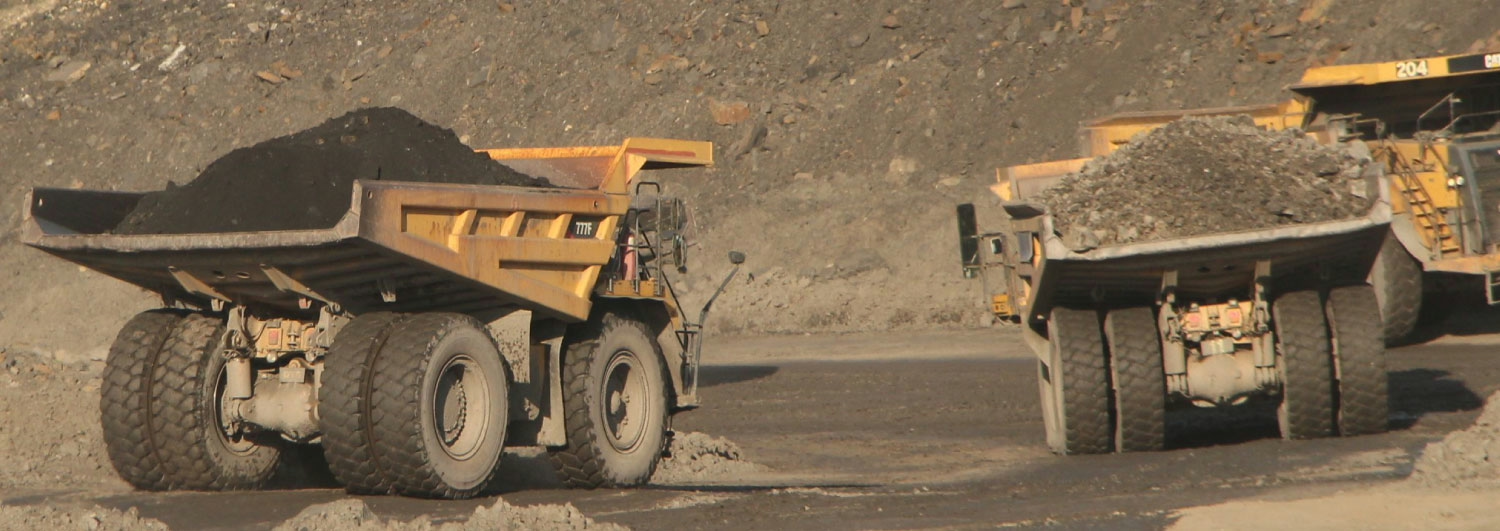
The UK Government has laid a Written Ministerial Statement confirming that it will introduce legislation to "restrict the future licensing of new coal mines", by amending the Coal Industry Act 1994, "when Parliamentary time allows".
The UK Government's press release is entitled "New coal mining licences will be banned". Here at Coal Action Network, we thinks it's great that the UK Government is following through on its historic manifesto pledge to rule out new coal mining throughout the UK. Following on the coattails of the UK’s exit from coal-fired power generation, this commitment bolsters the UK’s international reputation in leaving behind the world’s dirtiest fossil fuel. We hope to work with the UK Government to ensure no loopholes are carried into the final wording, and to leverage similar commitments in other G20 countries
In May 2023, Coal Action Network wrote to the Climate Change, Energy, and Infrastructure Committee (CCEIC) of the Welsh Senedd, informing the Committee of the ongoing illegal coal mining at Ffos-y-fran in Merthyr Tydfil, and the Council and Welsh Government’s refusal to use their enforcement powers to prevent the daily extraction of over 1,000 tonnes of coal. After being informed of this context, the CCEIC committed to a short committee inquiry on Ffos-y-fran and the broader failure of restoration of former opencast coal mine sites, with oral evidence sessions in April and May 2024, in which Coal Action Network participated. In August 2024, the CCEIC published its report on the handling of Ffos-y-fran and restoration of opencast coal mining sites across South Wales, citing ‘missed opportunities’ and referring to Ffos-y-fran as “symbol of the system's failures”. Both the Welsh Government and Merthyr Tydfil County Borough Council (MTCBC) responded in September 2024 to the 26 recommendations contained in the CCEIC’s report. A selection of their responses are summarised or quoted below with our analysis following each. This is the brief version, check out our full analysis report with accompanying pictures.
The Welsh Government should commission an independent review to assess the extent of, the funding needed to restore opencast sites to an acceptable level. The independent, review should consider what constitutes an “acceptable level” in consultation with local, authorities and communities.
Welsh Government isn’t liable for funding a programme dealing with open cast mining and land reclamation. Welsh Government has had statutory powers over ‘derelict land’ since April 2006, to protect public safety, create development land and enhance the environmental and social well-being of Wales. In recent years funding for such activity “has been restricted”. The Welsh Government is therefore concerned that assessing the costs to restore open cast sites may create an expectation that Welsh Government will then fund that restoration.
The operator and landowner is responsible for restoration and aftercare of opencast sites. They must also ensure that sufficient finance is set aside to enable them to meet restoration and aftercare obligations.
The Welsh Government repeat this through its response to the CCEIC’s recommendations, yet not once explain who is responsible when the operator and landowner fail to, or claim not to have, set aside sufficient finance to restore the site – which has happened at around 7 sites within the past 10 years in South Wales alone.
The Welsh Government should require local authorities to ensure all Planning Officers’ reports are available online alongside associated planning documents, including revised, restoration plans, where relevant.
We agree that transparency in planning decision making must be achieved, however, insisting on specific web publishing requirements at this time is premature.
The thrust of recommendation 9 is to ensure Planning Officer’s reports are made public, as Planning Officers’ reports summarise in plain English numerous technical planning documents. Public access to this key report would greatly improve transparency. The Welsh Government should urge Councils to make Planning Officers’ reports publicly accessible, where possible.
The Welsh Government should reconsider the proposal from the 2014 report to establish a virtual “Centre of Excellence” for restoration planning, particularly in light of potential coal-tip reclamation proposals, and lead discussions with local government on how to implement this.
Given our existing presumption against coal extraction, we expect “very few schemes being brought forward”. Our primary focus is to ensure that disused tips are safe and to deliver a modernised, fit-for-purpose regulatory regime. After the disused mine and quarry tips Bill is passed The Welsh Government will take “a more detailed strategic approach to mining and industrial legacy in Wales – this will need to include reclamation of disused tips and management of open cast mining.”
Contrary to the Welsh Government’s expectation of “very few schemes”, right now there are two schemes proposing coal extraction in South Wales, and a further application to downgrade the remediation scheme for Ffos-y-fran is expected before the end of this year. All these schemes would benefit from the kind of oversight the CCEIC are proposing with its recommendation for a Centre of Excellence, so action by the Welsh Government is needed now rather than years into the future.
The Welsh Government must engage with the UK Government with the aim of removing the Coal Authority’s statutory duty to maintain and develop an economically viable coal mining industry.
Whereas we would wish for the Coal Authority to remove its statutory duty to maintain and develop an economically viable coal mining industry, this duty has no practical effect in Wales… The Welsh Government is confident that it has in place the necessary policy and processes to ensure the climate emergency and nature emergency are fully reflected in any decision making.
Contrary to the Welsh Government’s confidence, its policies were deemed compatible with an opencast coal mine extension just last year in 2023. Additionally, the Welsh Government Minister for Climate Change Julie James wrote to the UK Government in 2021 stating that: “…we consider the statutory duty of the Coal Authority to develop and maintain a viable coal extraction industry must be removed if we are to achieve our policy ambitions…”, which is at odds with the Welsh Government’s response to the CCEIC’s recommendation, and there hasn’t been relevant Welsh policy evolution in the meantime to explain this new position.
The Welsh Government should review and update the Minerals Technical Advice Note 2 (MTAN2) to ensure it is fit for purpose, particularly in the context of new developments and coal tip remediation.
Minerals Technical Advice Note 2 Coal (MTAN2) contains comprehensive planning guidance which is robust about restoration and aftercare schemes for coal extraction. Along with all other planning policy, MTAN2 is kept under continual review to ensure it is kept up to date, fit for purpose and relevant.
The Welsh Government released MTAN2 in 2009, so it fails to reflect the many relevant policy developments over the past 15 years. The Welsh Government’s refusal to review MTAN2 is also bewildering given the policy has ostensibly failed to secure decent restoration of numerous coal mining sites across South Wales since its implementation. MTAN2 needs to be reviewed in line with the CCEIC’s recommendation.
The Welsh Government should incorporate provisions for the restoration of former opencast sites within the forthcoming Disused Tips (Mines and Quarries) Bill.
“In his Legislative Statement on 9 July 2024, the then First Minister made clear that inclusion of provisions relating to restoration of former opencast sites within the forthcoming Disused Tips (Mines and Quarries) Bill (the Bill) is not feasible at this time.” The Welsh Government cites further delay due to expansion of scope, and affordability as the key reasons for its position.
Coal tips are created by the act of deep coal mining. Overburden mounds are created by the act of opencast coal mining – there is little difference between the two in their risk or cause. The other hazards posed by abandoned and under-restored opencast coal mining sites should also be dealt with in the same legislation, given their shared cause, similar urgency, and methods of resolution (monitoring, landscaping, and earth works).
The Welsh Government must mandate public consultation for all stages of the restoration process, including when revised restoration plans are brought forward.
Public participation is very important at all stages of the planning process and is to be encouraged. The wide range of development types and scales mean planning legislation can only set a minimum standard of consultation…however we expect planning authorities to consult where the public is materially affected by the submitted details.
A restoration plan represents a promise made to nearby communities before they endure what is often years of disruption, noise, and dust during subsequent coal mining. Accordingly, those communities should be meaningfully consulted on proposed changes to that promise, with their feedback given significant weight in shaping associated planning decisions and conditions. We ask if the Welsh Government will issue guidance to Local Planning Authorities to this effect, to act on its acceptance in principle of the CCEIC’s recommendation.
The Welsh Government should advise local authorities to designate a specific officer as a point of contact for the local community, providing a direct communication channel between residents and local authorities on matters relating to sites or similar developments.
MTAN2 recommends the mining company appoints a site liaison officer. Additionally, Local Planning Authorities have a Planning Case Officer before an application is approved, and the enforcement team for after an application is approved.
Within Local Planning Authorities, Case Officers often say they are too busy with their main work to engage more with public enquiries and concerns. Given the potential impact of planning applications on nearby communities, there’s clearly a need to have a dedicated contact point for community input and involvement. We ask if the Welsh Government will issue guidance to Local Planning Authorities to this effect, to act on its acceptance in principle of the CCEIC’s recommendation.
The Welsh Government should advise local authorities to create online portals where residents can access up-to-date information on all stages of the restoration process.
Insisting on specific web publishing requirements at this time is premature. The Welsh Government is working with the Centre for Digital Public Services (CDPS) in exploring how digital solutions can improve the planning system in Wales. It is anticipated that the communication of decisions will form an integral part of that work. This will bring together the variability currently seen across authorities in a managed cost-effective way.
The Welsh Government should expedite online public access to planning documents, and have facilitating public engagement as an explicit aim of this work. The poor design of some planning portals currently create barriers to community members accessing critical information about developments that will potentially impact them. We ask the Welsh Government to centre a public consultation in its design of digitalised planning systems.
The Welsh Government should encourage the use of citizens' assemblies as forums for discussing the future of restoration sites, particularly where restoration failed to meet the original planning permission and compromises need to be made.
National planning guidance already recognises that well established liaison committees help to provide a better understanding of the impacts to be expected from mineral extraction. Many quarries and coal sites have established liaison committees which act as a forum for regular discussion and explanation of current problems. Where regular complaints are received or there is concern about local impacts the local planning authority should request that the operator cooperate in establishing regular meetings of a nominated group.
We agree with the National Planning guidance’s promotion of community liaison committees, but find execution is inconsistent, and in some cases, absent altogether – even where there are serious breaches of planning control and trust. This has left some participating residents we’ve spoken with feeling ignored and apathetic. We ask if the Welsh Government will reconsider the sentiment of the CCEIC’s recommendation, by strengthening the National Planning guidance on community liaison committees.
The Welsh Government must explore stronger enforcement mechanisms to address breaches of planning controls without delay, such as the mining activities that continued at Ffos-y-Fran after the licence expired.
The Town and Country Planning Act 1990 provides a range of effective enforcement options depending on the circumstances. Enforcement is focused on addressing the unacceptable impacts of unauthorised development rather than punishing the developer. Given the complex nature of planning impacts on both the environment and people it is sometimes acceptable to allow unauthorised activities to continue while consideration is given to the best course of action. That is what Merthyr Tydfil County Borough Council concluded at Ffos-y-Fran. However, where unacceptable harm is happening, the law does currently provide authorities with powers to stop activities immediately, either through a stop notice or Court injunction.
Ffos-y-fran highlights that enforcement options are only robust to the extent that they can be implemented. For 15 months, Merthyr Tydfil County Borough Council believed the consequences of using enforcement options available to it were worse than allowing severe, long-term, harmful, and persistent breaches of planning control. This suggests that current enforcement options are not fit for purpose. Therefore we ask if the Welsh Government will reconsider the CCEIC’s recommendation and review existing planning enforcement options for their practical effectiveness in controlling largescale developments?
The Welsh Government should consider the broader implications of the failures at Ffos-y-Fran and implement systemic changes to prevent similar issues in future, including in relation to coal-tip reclamation sites.
Welsh Government coal extraction planning policy is clear that development proposals will only be approved in wholly exceptional circumstances. There will therefore be very few schemes being brought forward. At the present time, our primary focus is to ensure that disused tips are safe and to deliver a modernised, fit-for-purpose regulatory regime.
In the face of the Welsh Government’s expectation of ‘very few schemes’, there are currently two schemes in pre-application consultation (Bedwas Tips and an extension to Glan Lash) proposing coal extraction in South Wales, with remediation dimensions. Ffos-y-fran is a current example of the abject failure of planning control to secure the agreed restoration, even after allowing 15 months of illegal coal mining with an associated 1.6 million tonnes of CO2. Ffos-y-fran is not a lone example, but rather part of a history of planning control failing to deliver the agreed standard of restoration at East Pit, Selar, Margam Parc Slip, and Nant Helen within the past decade alone in South Wales. If the Welsh Government refuses to learn lessons from this egregious breach of its own national policy on coal mining, it calls into question whether the Welsh Government gives the CCEIC’s findings the gravitas they clearly merit. Such a refusal also risks the repeat of mistakes that led to avoidable harm to surrounding communities, the local environment and restoration liability, our shared climate, planning control, trust in the Local Planning Authority, and Wales’s reputation as a climate leader. We ask the Welsh Government to reconsider the relevance and urgency of reviewing the broader implications of the failures at Ffos-y-Fran and implement systemic changes to prevent similar issues in future, in-line with the CCEIC’s recommendation.
In the event that the water cannot be drained from the, voids at the site, Merthyr Tydfil County Borough Council must ensure that any, water bodies resulting from the restoration at Ffos-y-Fran are safe and provide, benefit to the local community.
Accepting this recommendation with no further comment will not reassure local communities, particularly given the lack of consultation to date, and unsafe conditions documented around the flooded voids at similar sites of Margam/Parc Slip and East Pit former opencast coal mines.
Merthyr Tydfil County Borough Council must ensure, that the revised restoration plan reflects, as a minimum, the objectives of the, original restoration plan, including: safe public access across the East Merthyr, historic landscape with a new network of trails and footpaths; sustainable, wildlife habitats and biodiverse environmental sites; protection and restoration, of surviving heritage features; and the return of most of the site for traditional, commoners’ use.
Any revised scheme would inevitably differ in that overburden mounds 2 and 3 are, likely to be retained and a body of water will be incorporated into the scheme. The developer has also, indicated that they would wish to retain the motorcross facility.
Allowing the void to flood and letting the site operator leave its colossal coal tips (overburden mounds) above ground amounts to an abandonment of the original restoration objectives promised to local communities. As with MTCBC’s refusal to issue a Stop Notice to prevent the daily illegal mining of over 1,000 tonnes of coal, allowing a noisy motocross to be atop one of those coal tips that operated during this period of unregulated illegal activity, would be seen as another betrayal of local communities to the benefit of the mining company.
Merthyr Tydfil County Borough Council should fully, involve local residents in the consideration of revised restoration plans for the, Ffos-y-Fran site.
We are disappointed at this glib and non-committal comment and invite MTCBC to properly respond to the CCEIC’s recommendation 24.
Merthyr Tydfil County Borough Council should publish, the application for the revised restoration plan at Ffos-y-Fran and the planning, officer’s associated reports
Merthyr Tydfil County Borough Council:
Response: Noted
Our analysis:
We are disappointed at this glib and non-committal comment and invite MTCBC to properly respond to the CCEIC’s recommendation 25.

Smoke filled the sky across the industrial parts of the UK, as coal powered the industrial revolution. First coal brought prosperity and progress, but over decades the smoke stacks have been identified as a major cause of the climate crisis.
Over the last 20 years the UK has changed dramatically, with the closure of Ratcliffe on Soar power station at the end of September 2024, marking the beginning of a coal free era. As recently as 2012, coal provided 40% of the UK’s electricity, with around 40 coal mines extracting 17.1 million tonnes of coal, with an additional 45 million tonnes of coal imported from Russia, Colombia and the USA.
Ratcliffe on Soar, near Nottingham opened in 1967, with a capacity of 2,000 megawatts, enough to power 2 million homes. Since the early 2000s people across the UK have campaigned against coal power stations, coal mines and other coal infrastructure. Coal is the greatest historical cause of climate change and still a major global contributor of green house gas emissions.
In 2015, the UK was the first country to announce it would phase-out coal by 2025. While lauded as a big climate victory the Government’s intention was also to ensure coal didn’t exit the UK’s grid any earlier than 2025. At the time coal still contributed 9% of the UK’s electricity supply.[1]
Ratcliffe power station has seen its fair share of protests demanding closure. One example of direct action took place on the site in 2007, when Spring into Action, saw 11 people locked on to the dumper trucks and the conveyor belts, feeding coal to the power station. This caused major disruption to the plant operation, before they were removed. Back then Ratcliffe was the UK’s 3rd largest source of carbon dioxide emissions in the UK.
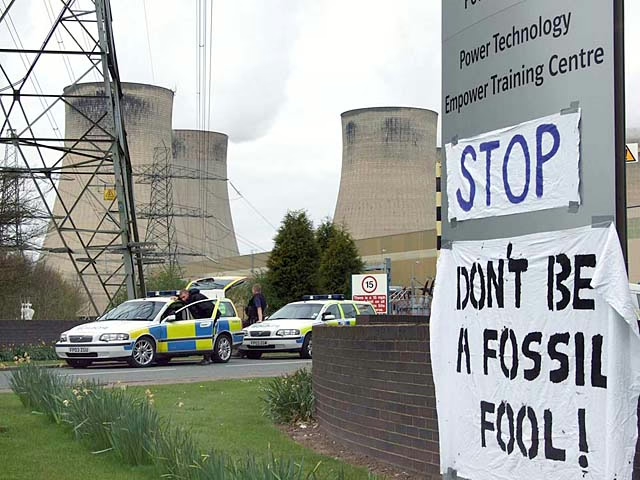
One of the group occupying the site said “the threat of climate change is so huge and the government so complacent that the people themselves are now acting in proportionate response to this and targeting the root causes of climate change.”
In a far cry from recent sentencing, in 2009, when 114 people were pre-emptively arrested from a meeting place in Nottingham, they were found to have been intending to occupy Ratcliffe for as long as possible. When activists were sentenced, one judge declared they acted with "the highest possible motives".i They accepted that they were intending to close the power station, but said that the urgency of climate change meant they had to take this action.
Undercover police officer Mark Kennedy, was involved in organising actions against Ratcliffe power station and as such some of the convictions were later overturned.
Three years ago, prior to the Glasgow COP climate summit, the phase-out date was brought forward to 2024. The UK wanted to be seen as a climate leader in phasing-out coal and setting up the Powering Past Coal Alliance with Canada in 2015, but others got there first.
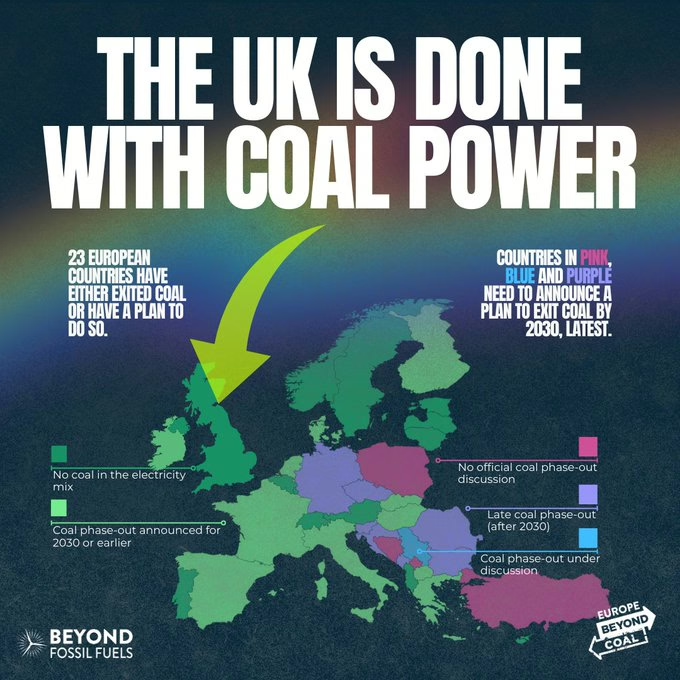
Although the UK was first to announce the end of its coal power sector, Belgium was the first European nation to stop burning coal, ending its use in 2016. Sweden stopped using coal in 2019, bringing forward the planned date by 2 years. Austria stopped using coal in 2020. Neither the Belgium nor Austrian phase-outs were considered to be government driven.i Portugal brought forward its phase-out date twice from a starting point of 2030 to 2021.
The UK Government extended the life of coal power stations after Russia invaded Ukraine. Drax, West Burton and part of Ratcliffe coal power stations were kept from retiring in 2022, in a fear that Russian warmongering would endanger electricity supply. The UK stopped Russian coal imports in response to the war.
In 2017, the UK had sourced 49% of its imported coal from Russia, where coal mining contributed to cultural genocide and laid waste to large areas of the country, decimating rivers, forests and agricultural areas.
Imported coal comes with a high toll for the local populations and campaigners in the UK have been pushing for an end to imports of coal from Russia as well as Colombia, while calling for the end of its mining and use in the UK. Over the years London Mining Network has brought visitors to the UK from international coal affected regions, particularly in Latin America. Meeting these campaigners has been profoundly moving experiences for people living close to proposed coal mines in the UK, as the similarities in their struggles are numerous, and it shows that the campaigns are thinking globally by acting locally and pushing for the end of coal power.
The movement against coal power in the UK has been wide, with people standing up and saying no to opencast coal mines near their homes and joining together to stop 45 planned new opencast coal mines from operating. Significant battles were fought at Lodge House in Derbyshire, in the Pont Valley in Durham and Ffos-y-fran the UK’s largest opencast mine, which was allowed by the Welsh Government to mine coal for an unbelievable 15 months after planning permission ended.
Coal Action Network has worked with communities resisting opencast and later deep coal mining across the UK. From its inception in 2008, it has supported more than 25 communities to stop coal mines and extension from destroying local wildlife, filling local people’s lungs with dust and the industrialisation of the countryside.
Site occupations have been a significant tactic in slowing or stopping coal mines from starting. Coal Action Scotland occupied several sites including Mainshill and later Glentaggart East, both in South Lanarkshire for action camps that disrupted operations on existing opencast sites. Scotland’s last coal power station, Longannet closed in March 2016, and the Scottish Government banned coal mining in 2022, in a protest against the proposed West Cumbria coal mine.
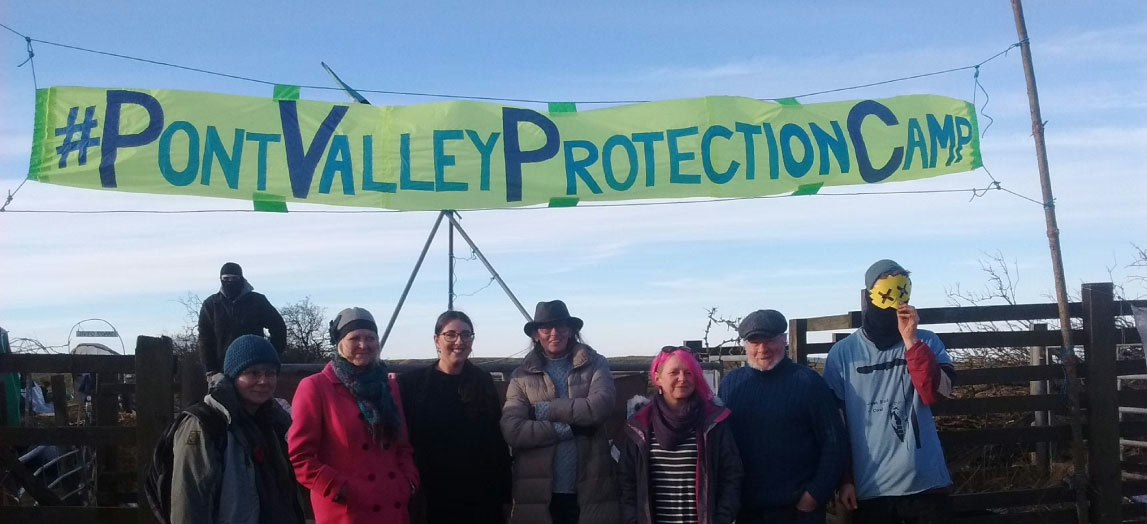
In 2018 the last two opencast coal mines started, both in County Durham, opposition to the one in the Pont Valley a protest camp was set up and featured in the urgent film documentary Finite: the climate of change. This campaign, and others in the North East had brought the local opposition to coal extraction to a head and in 2020 the proposed mines at Druridge Bay, and Dewley Hill were rejected, along with an extension to the Pont Valley opencast. Support for coal had turned a corner.
With the coal-phase out announcement and pressure on opencast coal mines coal companies started saying that their coal was destined for use in the steel industry. The second and third biggest single site emitters of carbon in the UK were Port Talbot steelworks and the steelworks at Scunthorpe. Drax power station has the dubious honour of being the biggest carbon emitter, which although it no longer burning coal, it does burning trees from old growth forests.
In September 2024 the planning permission for the proposed West Cumbria coal mine was revoked and then the license from the Coal Authority was rejected. Communities in Cumbria and beyond fought long and hard to bring about these results which were cemented in court by South Lakes Action on Climate Change and Friends of the Earth.
[1] Digest of UK energy Statistics 2017, page 14
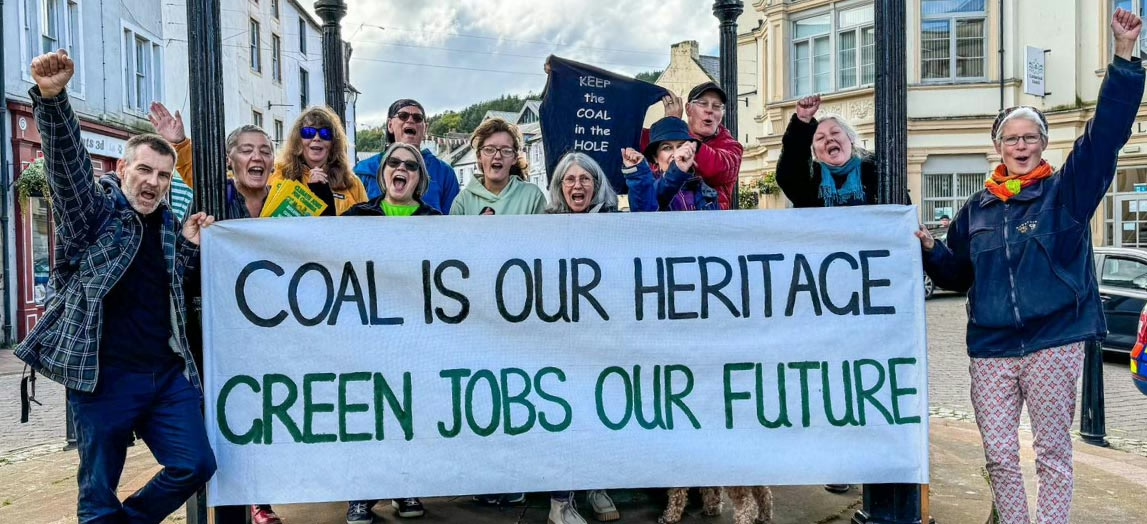

The public consultation window for the National Policy and Planning Framework represents the first opportunity since the new UK Government was formed to stop any new coal mine application winning planning permission across England. This sweeping change would go a long way to ruling out any new coal mines in the country.
For the last year we have been working behind the scenes to persuade political parties to commit to banning new coal mines in the UK. Thanks to our work, 5 major parties in Parliament committed to this in their manifestos, including the new UK Government.
One of the first actions the new Government is taking is to reform the National Planning Policy Framework. Their main focus is on building more houses and renewable energy projects. But one part of the NPPF advises local planning authorities on whether they should grant permission to applications for more coal extraction. Currently, the guidance is vague which and open to expensive legal challenge from mining companies which can make planners wary to refusing permission to new coal mine applications.
We know new coal extraction must be stopped, and we want the UK Government to ensure that happens in this reform by providing the clear direction planners need to confidently say NO to new coal mine applications.
The Government is running an open consultation on their proposed reforms until September 24th. The more folks who write in, the harder it'll be for the UK Government to ignore your collective call to draw the line in the sand right here, right now. Help us end coal mining in England by using our form to respond.
The Senedd’s Climate Change, Environment, and Infrastructure Committee (CCEIC) has released a critical report on the management of opencast coal mining in Wales, particularly focusing on Ffos-y-Fran, one of the last opencast coal mines in the region. The report describes Ffos-y-Fran as a “symbol of the system's failures”, highlighting significant shortcomings in oversight.
The CCEIC specifically calls out Merthyr Tydfil County Borough Council (MTCBC) for its inaction regarding illegal mining activities that continued after the mine's license expired in September 2022. The report questions whether MTCBC could have done more, noting the Coal Authority's concerns about the lack of a robust closure plan.
Local residents have expressed deep concerns about their treatment by public authorities. The committee emphasized the need for improved transparency and engagement, urging MTCBC to involve residents in the revised restoration plan.
Campaigner Chris Austin welcomed the report, stating it offers strong recommendations for policy changes regarding coal mine restoration. He expressed hope that the findings would lead to better outcomes for Ffos-y-Fran and prevent future issues.
We praise the CCEIC for investigating the failures that allowed illegal mining to occur without repercussions. The focus now must be on the Welsh Government and Merthyr Tydfil County Borough Council implementing the committee’s concrete recommendations to restore justice to affected communities.
Among the 26 recommendations (see below for a full list), the CCEIC calls for the Welsh Government to ensure that policies on opencast coal mining are robust and protective of local communities. The Coal Action Network advocates for a clear ban on coal mining in Wales, similar to Scotland's 2022 decision, to prevent mismanagement in the future.
The report serves as a crucial reminder of the need for accountability and proactive measures in managing natural resources in Wales.
Own emphasis
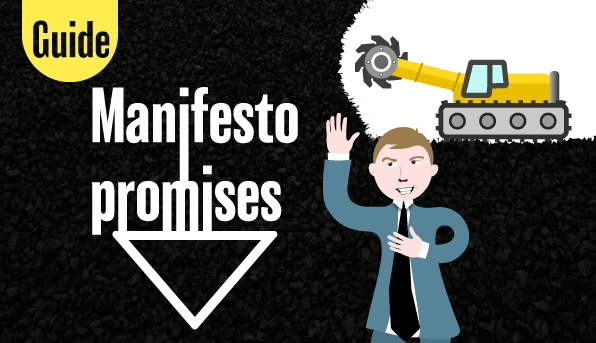

“...we will not grant new coal licences and will ban fracking for good.”
Manifesto in full

“Maintaining the ban on fracking and introducing a ban on new coal mines.”

“Cancel recent fossil fuel licences such as for Rosebank and stop all new fossil fuel extraction projects in the UK.”
“Ban new coal licences. Follow the SNP Scottish Government’s lead and commit to no support for new coal mines, which would undermine our action to reach net zero.”

“...are opposed to... new open cast coal mines. Opencast mine sites should be fully restored for the benefit of local communities, and should never be used as a guise for private companies to undertake further coal extraction.”
The Labour Party's manifesto pledge “we will not grant new coal licences and will ban fracking for good.” follows a year of inside-track and public campaigning by Coal Action Network in the UK parliament and Welsh Senedd.
The UK’s last coal-fired power station closes this year, and last year is confirmed the hottest year on record. We’re pleased that the Labour Party has listened to our arguments, along with the Liberal Democrats, the Green Party, Plaid Cymru, and Scottish National Party which have also ruled out any new coal mining.
We'll work with whichever party forms the new Government on turning a policy ruling out new coal licences into a stronger statute. We hope the new Government will also address existing coal licences – for both operating mines, such as Aberpergwm (permission to mine until 2039), and proposed mines such as West Cumbria (permission to mine until 2049). The West Cumbria coal mine is an example of how coal mine licences can slip through the coal regulator, even when there is no domestic demand for the coal and it'll be exported to drive further climate chaos.
Coal is still the number one fossil fuel driver of climate change globally - we must lead my example, and a policy ruling out any more licences for coal mining is just that.
Published: 17. 06. 2024
Coal Action Network asked Who will stop coal? last weekend in Whitehaven, West Cumbria. At the site of the proposed coal mine, members of the local community and supporters gathered to ensure that the question of the mine is being put to election candidates. Now we need you to crank up the pressure and make sure all election candidates across the UK faces this question as they could decide the fate of the coal mine if elected and legal challenges to the mine are successful next month...



The next Government may have the opportunity to not only stop the West Cumbria mine, but legislate an end to coal mining in the UK forever. We will be working hard behind the scenes to make that happen - but, the more you can help us, the better. Join us in writing to your local candidates (automatically selected) - this could be the first step in them helping to end coal mining in the UK for good.

On 23 October 2023, over 30 Wales-based NGOs, businesses, and community groups signed an open letter to Wales’ Climate Change Minister, Julie James, calling for the Welsh Government to ban coal mining once and for all (sent by Climate Cymru). On 10th January 2024, Julie James wrote back—but claims a ban isn’t needed, even though 1.6 million tonnes of CO2 could have been prevented since 2022 if the Welsh Government had adopted a ban. That failure has caused 362 additional deaths from climate change related causes. Julie James’ claims just don’t stack up against those lives lost. Here’s why:
The open letter to Julie James highlighted that an issue with the current policy is that it is riddled with caveats and exceptions. Carmarthenshire County Council’s Planning Officer even wrote in September 2023 that it was “difficult to know for certain how to interpret the coal policy”. Julie James failed to respond to this point entirely. A clear ban would remove the existing ambiguity that makes the current policy challenging to apply.
Julie James also did not respond to our point that Merthyr (South Wales) Ltd would not have been able to mine 500,000 tonnes of coal from Ffos-y-fran over the past 1.5 years if there was a clear ban on coal mining. The mining company exploited the exceptions in existing policies to secure a de facto extension. To protect against this climate assault recurring by closing the loopholes, a clear coal ban is needed now.
In the open letter to Julie James, it’s stated “A coal mine ban can be drafted is such a way that allows for the safe winding down of existing coal mines, and Coal Authority access to fulfil its regulatory duties”. That didn’t stop Julie James trying to use that against a ban anyway: “we also have a duty to manage the safe closure and restoration of existing and historic mining infrastructure”. Julie James accompanies this with a reason that’s even more bizarre: “The incidental extraction of limited coal may also be required during the construction of infrastructure projects”. Those wouldn’t be coal mines so wouldn’t fall under a ban—the Coal Authority even licences this differently as an ‘incidental coal agreement’. The burden and hazards of historic mines across Wales would diminish under a coal ban, rather than risk being added to—a very real risk in light of Ffos-y-fran.
Julie James says “…coal licences may be needed in wholly exceptional circumstances and each application will be decided on its own merits”. But this creates exactly the problem that Julie James lamented in her letter in October 2011 to then Minister for BEIS Kwasi Kwarteng: "both the developer and the Coal Authority committing significant resources respectively to preparing and determining applications... before Welsh policy can properly be applied”. A coal ban would end the pipeline of applications, and the private and public funds they waste.
Julie James twice hails “the presumption being against extraction” in current policies. We hope it’s not presumptuous to argue for a commitment stronger than a ‘presumption’ in the face of catastrophic climate change. What justification could opening a new coal mine have in the face of the 362 lives that’ll be cut short due to the Welsh Government’s refusal to ban coal mines up until now? Climate vandalism over the past year shows nothing short of a ban on coal mining can protect the lives and ecosystems at stake.
Finally, Julie James concludes her letter by claiming the “Welsh Government has adopted and implemented the strongest policy opposition to coal extraction across the UK Governments”. Even if that were true, the Welsh Government clearly needs to go further given current policies have failed to prevent 1.6 million tonnes of avoidable CO2 in the past 1.5 years. But it’s also not true. Julie James’ claim to be leading on a progressive coal policy is based on her comparison to a similar one set out in the Scottish Parliament back in November 2021. She ignores the de facto ban that the Scottish Government more recently introduced in October 2022—as referenced in the open letter to Julie James. If Julie James actually wants the Welsh Government to boast the strongest policy opposition to coal mining, she’ll have to be bolder by committing to a ban on coal mining in Wales.

Over 30 Welsh NGOs and businesses have signed a letter to Welsh Minister Julie James and Deputy Minister Lee Waters, demanding they draw a line in the sand and announce ban on any further coal mines on Welsh soil. The letter was sent to the Welsh Government on 11th October 2023.

The Welsh Government already has policies against new and extended coal mines but these are caveated and confusing. The renewed call for a clear coal mining ban comes less than a month after existing policies would have failed to stop a recent bid to reopen the shuttered Glan Lash opencast coal mine in Carmarthenshire. The coal mining company, Bryn Bach Coal Ltd, applied to double the size of the coal mine over six years. Controversially, Carmarthenshire County Council’s Planning Officer advised Councillors in the Officer’s Report, and at the Planning Hearing, that "Overall, it is considered that the proposals would largely meet the criteria of the coal policy" (p66). Ultimately, the application was rejected on the grounds of local ecological impacts—but it has exposed the weakness of existing policies, with the Planning Officer adding that it is “difficult to know for certain how to interpret the coal policy” (p66).

The open letter coincides with the first anniversary of Scotland’s announcement of its own de facto ban on coal mining, in October 2022. Daniel Therkelsen, campaigner at Coal Action Network says “The Welsh Government faces a choice—align itself with the backtracking and flip-flopping of the UK Government, or regain its international leadership position alongside Scotland, as a progressive country of confidence and stability for green industry to thrive.

Welsh Minister for Climate Change, Julie James, wrote a letter to the UK Government in October 2021, lamenting the current policy situation, which “results in both the developer and the Coal Authority committing significant resources respectively to preparing and determining applications”. NGOs and businesses that signed the open letter to Ministers Julie James and Deputy Minister Lee Waters are calling for a clear coal ban that clears up the confusion Carmarthenshire Council identified and the caveats that creates uncertainty and potentially wasted resources for coal mining companies, such as Merthyr (South Wales) Ltd, which also applied for an extension in September last year but was conversely rejected due to the Welsh Government’s coal policies by Merthyr Tydfil County Borough Council.

Daniel Therkelsen, Campaigner, Coal Action Network: “The Welsh Government has said their position is ‘clear’, that ‘they want to bring a managed end to the extraction and use of coal’—but their jigsaw of policies on coal is as clear as the coal dust that continues to plague communities living around mines in South Wales, ban new coal mines and extensions and be done with it. Nothing about a ban would prevent access by the Coal Authority to address safety issues.”.
Overview and key facts on Glan Lash opencast coal mine extension application. The extension application was to extract a further 95,038 tonnes of coal (more than the original coal mine, licenced for just 92,500 tonnes).
Key Welsh Government policies relating to coal extraction include:
Planning Policy Wales (Edition 11) s.5.10.14 “Proposals for opencast, deep-mine development or colliery spoil disposal should not be permitted. Should, in wholly exceptional circumstances, proposals be put forward they would clearly need to demonstrate why they are needed in the context of climate change emissions reductions targets and for reasons of national energy security.”
Minerals Technical Advice Note 2: Coal “Government policies and planning guidance on the provision of coal have previously been set out in Mineral Planning Guidance Note 3 (MPG3) published in 1994 for England and Wales. MPG 3 (1994), apart from the Annexes, was cancelled by MPPW. This MTAN supersedes the 1994 Annexes, which are hereby cancelled… This coal MTAN sets out how impacts should be assessed and what mitigation measures should be adopted, and seeks to identify the environmental and social costs of coal operations so that they are properly met by the operator.”
Coal policy statement, 22 March 2021: “The opening of new coal mines or the extension of existing coaling operations in Wales would add to the global supply of coal, having a significant effect on Wales’ and the UK’s legally binding carbon budgets as well as international efforts to limit the impact of climate change. Therefore, Welsh Ministers do not intend to authorise new Coal Authority mining operation licences or variations to existing licences. Coal licences may be needed in wholly exceptional circumstances and each application will be decided on its own merits, but the presumption will always be against coal extraction.”
Published: 10.10.2023